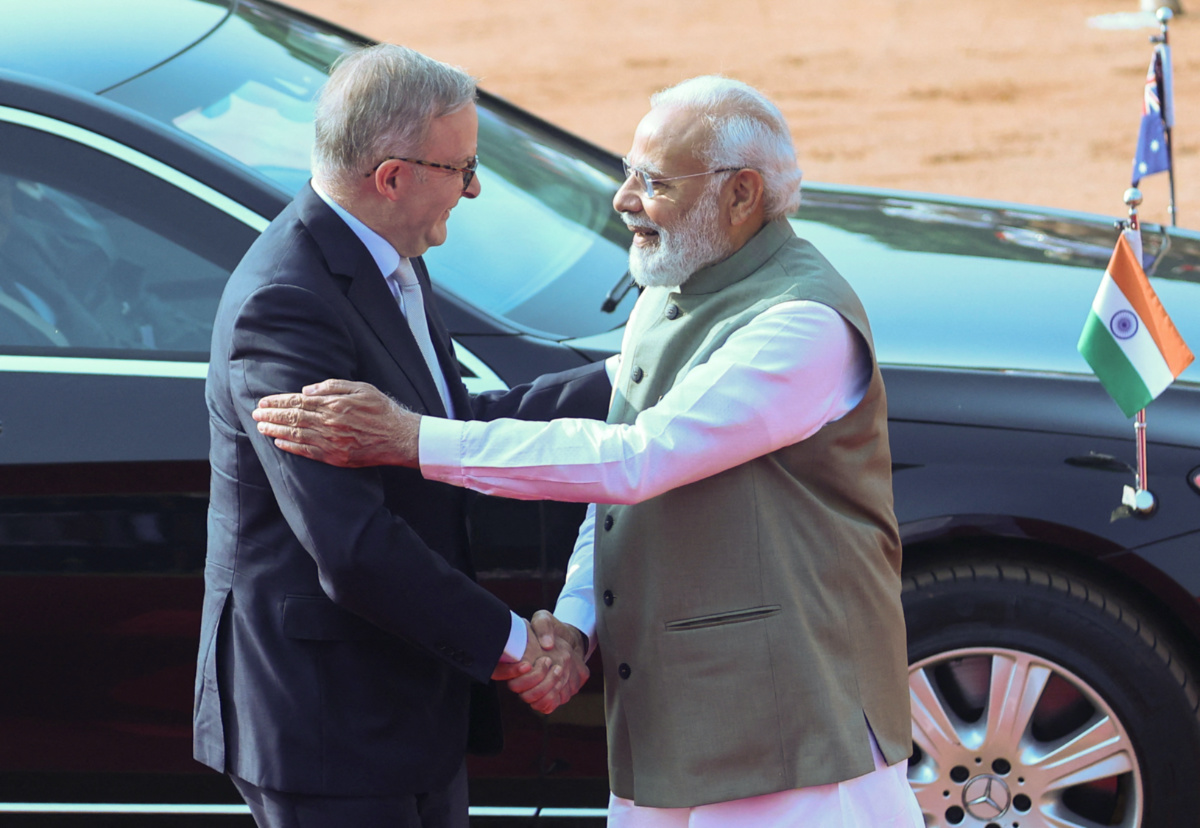
TIM COSTELLO, a senior fellow at Australia’s Centre for Public Christianity, reflects on the balance between promoting national interests and calling out injustices…
Melbourne, Australia
I congratulate Australian Foreign Minister Penny Wong on the $A29 million package for the hungry just announced – a decent Australian contribution to a forgotten crisis.
Just last week I was having a weird conversation about the famine in the Horn of Africa with African friends – a judge and professor respectively in their home nation. Weird, because it took place while I was holidaying in France, drinking Bordeaux chateau wines and savouring great food in the Dordogne region, while so many people are close to starving in Somalia, Sudan, Kenya, and Uganda. Four seasons of failed rains and the Russian Ukraine war have seen the loss of the wheat supplies these nations depend on.

Australian Prime Minister Anthony Albanese shakes hands with his Indian counterpart Narendra Modi during his ceremonial reception at the forecourt of India’s Rashtrapati Bhavan Presidential Palace in New Delhi, India, on 10th March, 2023. PICTURE: Reuters/Altaf Hussain
Even weirder than the discrepancy between our good life holidaying in the Dordogne and our depressing conversation about our duties to fellow humans in sub-Saharan nations was where our conversation went next.
Joining our holiday was an Australian prosecutor working at The Hague on the war crimes of Vladimir Putin. Why, we asked our African friends, had so many of their nations abstained or voted against the UN motion to censure Putin? Surely it is a black-and-white ethical choice?
“I watched Modi’s Australian visit, the weird adulation he received in a Sydney stadium and our PM wearing an orange tie, calling him ‘The Boss’ and failing to say one word of public criticism about the repression of minorities in India.”
Their answer was that it affords them leverage to play off the West and Russia and China, so their nation could advance their own economic interests.
I went to bed deeply troubled. But the next day I watched Modi’s Australian visit, the weird adulation he received in a Sydney stadium and our PM wearing an orange tie, calling him “The Boss” and failing to say one word of public criticism about the repression of minorities in India. This mega event was heavily promoted through Modi’s BJP’s party pet media outlets to demonstrate his global reach and the admiration he commands. In their language he is a ‘Vishwaguru’ or a ‘Guru for the world’ and not just India. Albanese naming him “The Boss” just confirmed that worldview.
While sport-loving Australian political leaders will mainly get booed if they take the microphone in a sports stadium, Modi has had a 100,000 seating sports stadium named after himself at home. He is the supposed megastar, above politics, who also just happens to have had his judiciary system suspend his opponent from parliament on spurious charges of criticising authorities.
Suddenly I felt less judgmental towards the nations of my African friends.
Geopolitics is full of self-interest and resultant hypocrisies. No nation is pure. I accept that we need India to balance the much greater threat of China. I want to see Australian businesses prosper with a free trade agreement with India. Of course, with 700,000 Australian Indian voters, there are domestic political interests in play. And I certainly condemn the graffiti attacks on Hindu temples in Australia.
But the Australian Government knows about the more than 200 churches looted, desecrated, and burnt in Manipur by Hindu fanatics. They do know about the persecution of Muslims, Jains, and Sikhs by the same fanatics, and the shadowy RSS paramilitary organisation behind Modi.
The RSS has an Hindutva agenda that to be Indian is to be Hindu. It is intent on overturning the secular constitution of India since its foundation. Christians Muslims, Sikhs, and Jains have been in India for centuries and protected by a secular constitution but are now feeling threatened.
They also know that Modi plays the card of ethnic tensions, stirring his Hindu base for the political advantage of his BJP government. They do know that India is now ranked lower than Afghanistan and Pakistan in the World Press Freedom Index released by Reporters Without Borders.
We rely on our readers to fund Sight's work - become a financial supporter today!
For more information, head to our Subscriber's page.
I accept our leaders’ assurances that human rights issues in India are not shirked but are raised in private. No doubt Penny Wong and our PM are not the least bit comfortable with Modi’s ethno-religious authoritarianism.
But if we are such good friends now – in a bilateral sense as well as in our shared security interests in the Quad – then surely you can explain to a friend that our values simply require a non-provocative but honest public comment about our concerns.
A friend can explain that we will and must speak up for Indian minorities. When global leaders like the Quad fail to speak up, they fail these vulnerable and threatened minorities who watch their rights being steamrolled by a Hindu majority. When our fear of China is so consuming that public events in our democracy are made to serve Modi’s next election campaign, then even Indian-Australians feel dismayed, fearful, and disenfranchised.
Geopolitics will always be complex and self-interested. But if we stick to our values, it does not have to be unnecessarily weird.

Tim Costello is a senior fellow at the Centre for Public Christianity. Tim is also a member of the Sight Advisory Board.






